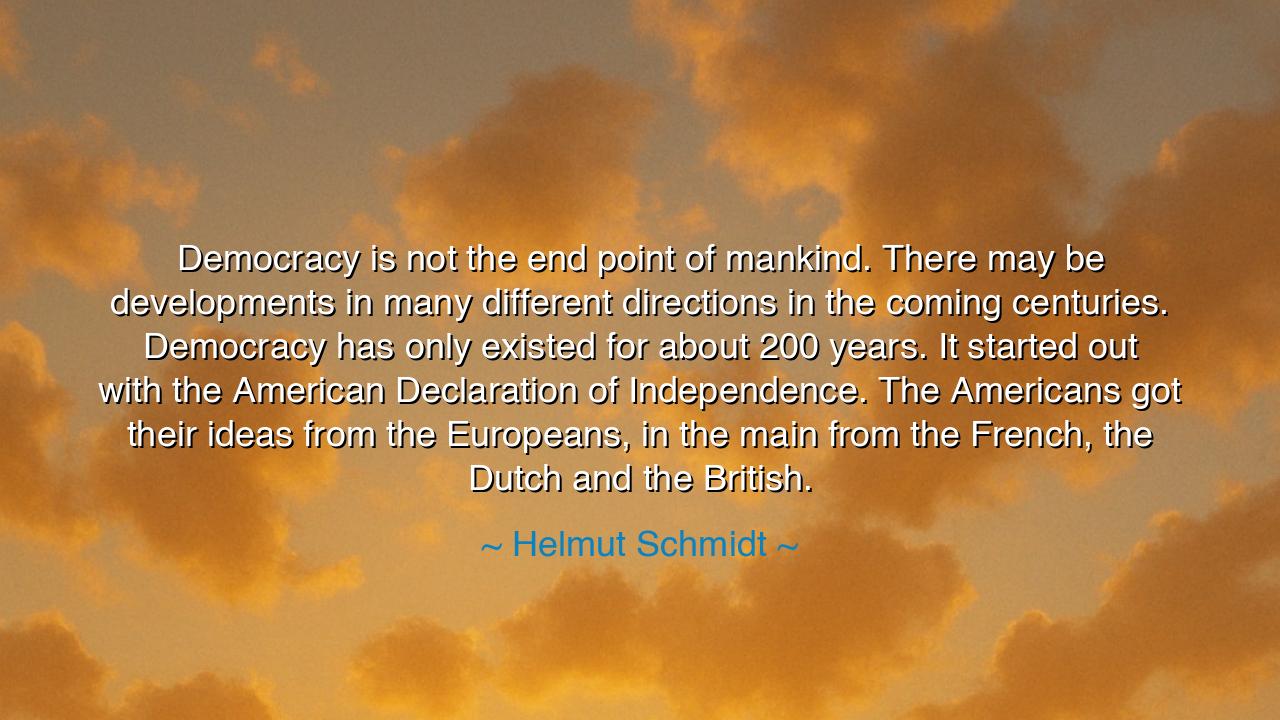
Democracy is not the end point of mankind. There may be
Democracy is not the end point of mankind. There may be developments in many different directions in the coming centuries. Democracy has only existed for about 200 years. It started out with the American Declaration of Independence. The Americans got their ideas from the Europeans, in the main from the French, the Dutch and the British.






Hear the thoughtful and far-seeing words of Helmut Schmidt, the wise statesman of Germany, who once said: “Democracy is not the end point of mankind. There may be developments in many different directions in the coming centuries. Democracy has only existed for about 200 years. It started out with the American Declaration of Independence. The Americans got their ideas from the Europeans, in the main from the French, the Dutch and the British.” In these words, there is neither arrogance nor despair, but a philosopher’s calm reflection — a reminder that the story of human governance is not finished, that even the most cherished systems of our age are but chapters in the great book of civilization.
The origin of this thought lies in Schmidt’s lifelong devotion to realism and wisdom. As Chancellor of West Germany during the Cold War, he lived in a time when democracy was seen not only as a political system, but as the moral victory of the free world over tyranny. Yet Schmidt, who had witnessed both the rise of fascism and the rebuilding of liberty, spoke not with the certainty of a zealot, but with the humility of a historian. He reminded his generation — and all who would come after — that democracy, though noble and precious, is not eternal by nature. Like every creation of humankind, it must evolve, adapt, and renew itself — or perish.
When he said that democracy began with the American Declaration of Independence, Schmidt was not denying the ancient roots of freedom. He knew well that the soil from which democracy grew was tilled by many hands — the philosophers of Greece, the republics of Rome, and the thinkers of Europe’s Enlightenment. But he pointed to that moment in 1776 as a rebirth — when the principles of self-rule and human equality took form as a new experiment in governance. The Americans, he observed, drew not from divine revelation, but from the European tradition of reason — from the French philosophers who spoke of liberty, the Dutch who practiced tolerance, and the British who wrestled with constitutional balance. Thus, democracy was not a miracle, but a mosaic: the patient work of centuries of thought, trial, and error.
In saying that democracy is not the end point of mankind, Schmidt reminds us of a truth that the ancients would have understood well: that no human order is perfect, and none lasts forever. The Athenian democracy, once the pride of the ancient world, fell into corruption and chaos. The Roman Republic, once the envy of nations, gave way to empire. So too might our modern democracies falter if they mistake survival for success, and tradition for perfection. Schmidt’s words call us to humility — to see democracy not as a divine gift, but as a living creation, fragile and fallible, whose fate depends on the virtue and vigilance of those who sustain it.
Consider the fall of Weimar Germany, where democracy itself was devoured by apathy and extremism. In that tragedy, Schmidt learned what history teaches all too often: that liberty dies not only from invasion, but from within, when its people cease to honor its responsibilities. Democracy, he warns us, is not a monument to be admired, but a discipline to be practiced. It requires courage, compromise, and an unending commitment to truth. Without these, it will crumble — and in its place may rise forms of rule yet unimagined, not all of them just or humane.
Schmidt’s prophecy that “there may be developments in many different directions” is both a warning and a challenge. The world may move toward new forms of governance — technological, collective, even global — that we can scarcely imagine today. Whether these future systems uplift or enslave will depend on whether humanity retains its moral compass — the belief in human dignity that once inspired the Declaration of Independence itself. For while systems may change, the eternal struggle between freedom and power, between justice and domination, will never end. The wise must therefore prepare not only to preserve democracy, but to guide its evolution toward greater wisdom and compassion.
So let this be the lesson of Helmut Schmidt’s words: that democracy is not a destination, but a journey — not the summit of human endeavor, but a path that must be walked anew with every generation. Do not worship it as perfect, nor dismiss it as flawed, but tend to it as one tends a living garden — pruning corruption, nourishing justice, and planting the seeds of renewal. For the moment we believe that democracy is complete, it begins to decay; but when we see it as a work forever in progress, it remains alive and strong.
Therefore, my children, remember: the future belongs not to the complacent, but to the vigilant. Question the systems you inherit, but preserve the virtues that sustain them. Stand guard over freedom, yet dream of what might follow it — a world where the wisdom of all peoples and ages joins in the building of something greater. For democracy, as Schmidt taught, is not mankind’s final form — it is merely one bright flame in the long, unfolding dawn of human civilization.






AAdministratorAdministrator
Welcome, honored guests. Please leave a comment, we will respond soon